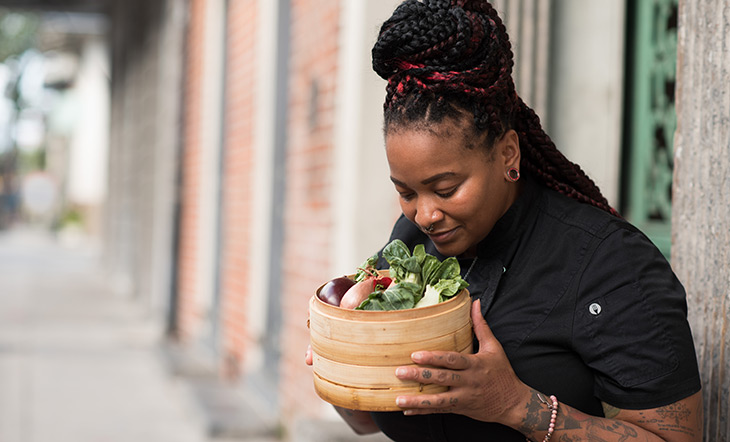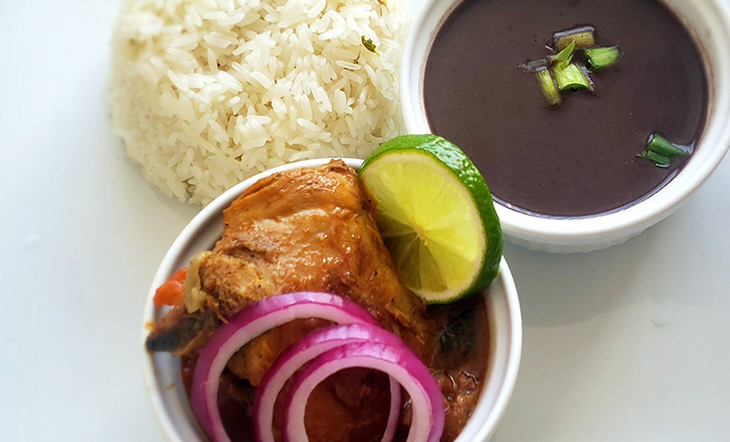
The COVID-19 pandemic has been devastating for the restaurant industry, permanently shuttering 17 percent of restaurants nationwide, and revealing inequities and vulnerabilities baked into the foundation of these businesses. But there is hope on the horizon, as vaccines roll out and more food professionals are immunized. At the James Beard Foundation, we’re looking forward with optimism, while also striving to provide resources and tools to help the industry recover and rebuild with equity and sustainability at its heart.
A key part of our efforts to support and rebuild the industry is the Food and Beverage Investment Fund for Black and Indigenous Americans. Over the past few months we’ve disbursed grants of $15,000 each to 37 independent businesses across the country, who are not only using the funds to keep the lights on or rehire staff laid off during the pandemic, but to grow as leaders in their communities and beyond. For the next few weeks, we’ll be showcasing our grantees, from their menus to their local impact. Read on for inspiring stories and delicious dishes, and learn more about supporting the Investment Fund at our upcoming event featuring conversations with three of the grantees.
--

Black Roux Culinary Collective
@blackrouxculinarycollective
New Orleans
Myisha Mastersson’s passion for cooking has deep roots: she whipped up her first Thanksgiving dinner for her family at age 11 and catered her mother’s wedding at 19. After years offering catering and private dining experiences, Mastersson launched Black Roux Culinary Collective in 2019. The company provides culinary classes focused on different global cuisines, paired with a pop-up, invite-only supper club and a guided group travel tour of the region. Black Roux’s first trip was set for June 2020, but COVID-19 travel and dining restrictions forced Mastersson to upend her business model. Her pandemic pivots—a series of pop-ups and an underground supper club—proved successful, and now Mastersson is looking for space for brick-and-mortar location where she can teach and hold events. The Black Roux umbrella also extends to Mastersson’s nonprofit urban farm in the Lower 9th Ward, Black Roux Farms, which has been giving away free produce boxes to feed those in need during the pandemic.

Bow & Arrow Brewing Company
@bowandarrowbrewing
608 McKnight Ave NW, Albuquerque, NM
Before opening Bow & Arrow Brewing Company in 2016, founder Shyla Sheppard spent nearly a decade working as a social impact investor in the southwest. A member of the Mandan, Hidatsa, and Arikara tribes, Sheppard grew up on the Fort Berthold Indian Reservation in North Dakota, eventually moving west to California to attend Stanford. She found her passion for brewing and craft beer in college, and her inspiration for Bow & Arrow when she landed in New Mexico. The brewing company’s goal is to highlight the state’s indigenous culture and history through the business’s branding and its wild, sour, and southwest-inspired beers, which feature ingredients from native communities. Prior to COVID-19, Bow & Arrow had drawn all its revenue from their on-site beer hall, and when the pandemic hit Sheppard was forced to lay off most of her staff and pivot funds intended for a new taproom to buying canning equipment for wholesale customers in New Mexico. She plans to expand the wholesale business into other states and is hoping to open a new tap room off-site.

Cajun Fire Brewing Company
@drinkcajunfire
10555 Lake Forest Blvd, Ste 3C, New Orleans
Cajun Fire, a family-owned brewing company located in New Orleans, is the first Black-owned brewing company in Louisiana and the South, and the fifth Black-owned brewery in the U.S. post-Prohibition. Founder Jon Renthrope started Cajun Fire in 2011 with investments from family and former high school classmates, with the mission of “brewing for socio-economic gains one pint at a time.” The brewing company is located in the New Orleans East neighborhood, which has struggled to recover since Hurricane Katrina in 2005. Cajun Fire is dedicated to building up the community and bringing tourist interest to the area, raising over $700,000 for local New Orleans organizations since its founding, and building out a 10-acre commercial development project to promote and sustain the area. Renthrope, who is also a member of the Houma tribe, draws on his heritage for Cajun Fire’s can designs and beer flavor profiles, which are also influenced by Cajun, Creole, and African Diaspora cultures.

Haiti Kitchen
4255 S Dean Martin Drive St. 6, Las Vegas
Haiti Kitchen started to answer a very specific question—where to find a Haitian restaurant in Nevada? Fritz Edmonis, who emigrated from Haiti to the U.S. as a child, had lived in Las Vegas for over two decades, but had yet to encounter a restaurant in the city or state that offered up the food from his native country. Edmonis launched his Haitian food concept in 2020 out of a commercial kitchen, offering up chicken and oxtail stews, griot, pikliz, and more. Haiti Kitchen switched to online ordering for takeout when the pandemic started, and is now temporarily closed as Edmonis works to evolve the business into a brick and mortar restaurant.
La Vie En Rose Café
New Orleans
La Vie En Rose Café is a Creole-inspired coffee shop named after Louis Armstrong’s rendition of the song “La Vie en Rose.” Owner Kirby Taylor Jones draws on recipes and culinary traditions from her family’s 300-year Creole lineage for the café’s menu. After a series of pop-ups, Jones opened a permanent iteration of the café in November of 2019 in the lobby of the Contemporary Arts Center in New Orleans’s warehouse district, a tourism hub for the city. Unfortunately, COVID-19 travel restrictions effectively erased all foot traffic, and limited the number of locals who could still visit La Vie En Rose. Thanks to local support, Jones was able to stay open, but decided to move to a new location in a more pedestrian-oriented neighborhood. She plans to use the grant towards equipment and city permits to relaunch the café in its new home.
-opt.jpg)
Ms. Betty’s Cooking
@msbettysgrandson
Denver
After stints at restaurants across Denver, Tajahi Cooke started Ms. Betty’s Cooking in 2017 while working as personal touring chef for Rebelution. The business, also run by Cooke’s wife Danielle, covers a wide range of projects from pop-up dinners to community events to even a curry blend based on Cooke’s family recipe. Last fall, Ms. Betty’s Cooking popped up at Brutø as part of a six-week series of “advocacy” dinners Cooke helped to organize with chef Kelly Whitaker to showcase guest chefs, social causes, and local producers. And even with the limitations of the pandemic, the husband-and-wife duo were able to host their second-annual Madsgiving, providing nearly 3,000 free Thanksgiving dinners to homeless individuals and families at the Salvation Army. These days Ms. Betty’s Cooking can be found at a monthly supper club series at Fireside at Five, offering dine-in, takeout, and virtual cook-along options to diners.
Register for our event on April 29 featuring Investment Fund grantees.
Read more about our Investment Fund grantees.
--
Maggie Borden is director of content strategy and development at the James Beard Foundation. Find her on Instagram and Twitter.



-57 web.jpg)


